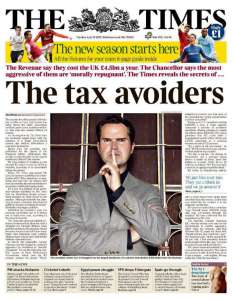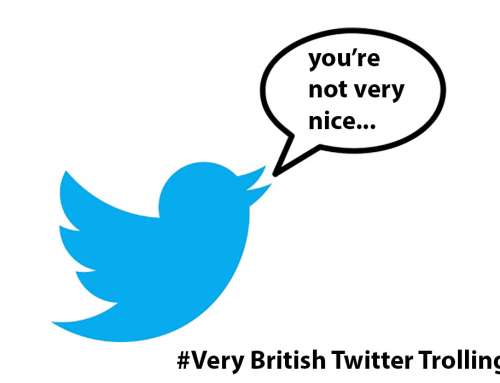In terms of a reputation fallout it was pretty hard not to notice the singling out of Jimmy Carr and his accounting practices through Jersey based K2 Tax scheme this week, as was that of Gary Barlow whom was reported to have invested in a similar scheme with the firm Icebreaker Management Services.
 Now this isn’t to say that Mr Carr and Mr Barlow haven’t been a little naughty and you can see how the taxpayer at large will view such practices, but the sums involved in their {Carr and Barlow} respective tax efficiency/avoidance schemes pale in comparison to certain captains of industry.
Now this isn’t to say that Mr Carr and Mr Barlow haven’t been a little naughty and you can see how the taxpayer at large will view such practices, but the sums involved in their {Carr and Barlow} respective tax efficiency/avoidance schemes pale in comparison to certain captains of industry.
Small fish in a very big barrel
Not to single out one person here (as there are many to chose from) but if we look at Sir Philip Green (BHS, Arcadia, Topshop) he became the single biggest target of activist group UK Uncut in November 2010 for “his history of corporate tax avoidance”.
He also was singled out in respect of the issue surrounding his wife, rather than him owning the Arcadia business (handed over in 2002) through an offshore holding business which in doing so, meant his wife, a resident in Monaco, benefited from the dividends paid from his retail group and in doing so, avoiding any tax liability for the family.
When the sums involved are well over £1bn in dividends and payments (£1.2bn alone paid in 2005) that have been ‘tax efficient’ one has to wonder why if MP’s are calling for Mr Barlow’s OBE to be taken from him, why has Sir Phillip not had his knighthood challenged? Surely we ‘are all in this together’?
In 2010 Nick Clegg pledged to crack down on tax avoidance yet at the same time the government controversially appointed Philip Green as an efficiency advisor.
Carr and Barlow’s Reputation
It has to be noted that all of the schemes and tactics employed by Carr, Barlow and Green are perfectly legal. Whether they are moral is another point, but as with any practice of ‘cheating the system’ as it were, isn’t there also a responsibility for the system to step up and employ a better system?
Whilst the offline and online reputation fallout from the ‘tax dodging’ allegations is in the early stages, Mr Carr has taken the best course of action and this morning confirmed to BBC news et al, in a tweet that he was no longer involved in the scheme, that he apologises. That he made an error of judgement and in future will conduct his financial affairs much more responsibly.
Forgive and Forget
The phrase, which has been in English language since at least 1603 and quoted in Shakespeare‘s King Lear is one I reference quite often in dealing with companies whom have been the subject of a reputation fallout in that, save for Almighty Actions of Morality destroying a brand, more often than not the wisest course of action is to hold your hands up at the first opportunity, apologise and move forward. When your actions are forgiven, they can then be forgotten.
That Carr was a marketing executive for Shell before his career in comedy may have had a part in his quick response but nevertheless, that he is the first (in the latest row of tax avoidance) to come forward and apologise means that he will also be the first to be forgotten as other celebrities remain in the sights of the baying mob and media, out for moral justice.
Wider Debate and Action
The whole issue of tax efficiency/avoidance does need some much needed attention and wider debate as whilst the public at large may forgive moderate tax efficiency the key discussion point is when does efficiency become avoidance?
You can argue that if there was a footballer on £100,000 per week who handed over £25,000 in tax a week, he isn’t paying his full tax liability but the sums involved may offset some of the bitter taste in the tax efficiency measures and so that would be deemed morally acceptable? Whereas a similar footballer who has his wages and sponsorship monies paid to a number of companies thus reducing his tax bill to 1% of earnings is downright despicable.
There is a huge abyss between the opposing poles of legal and moral in respect of tax efficiency/avoidance and in the absence of action from Government in making the system fairer and more robust I can see many more reputation issues arising for celebrities and businesses and business owners alike in the foreseeable future.
At the end of The Big Short, the highly amusing film about the 2008 crash, Steve Carell’s character, Mark Baum (based on investor Steven Eisman) who saw the crash coming predicts: “I have a feeling, in a few years people are going to be doing what they always do when the economy tanks. They will be blaming immigrants and poor people.”
The irony is painful in that whilst the small business and the average worker pay their fair share in taxes or face stiff and unrelenting consequences, those who have such a higher tax bill often avoid their fair share and whilst the focus is on issues like NHS tourism in the context of “blaming immigrants and poor people.” if the very wealthy and the corporations paid their fair share in tax, the government would have the resources without needing to divert focus and misdirect attention, as it so often does in this regard.






Leave A Comment
You must be logged in to post a comment.